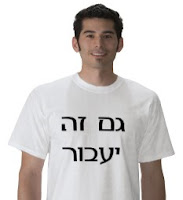Does looking up the word for your Hebrew tattoo, in a dictionary, sounds like a good idea? Today's victim apparently thought so...

The girl wanted a Hebrew tattoo saying a very spiritual
"believe". The resulting tattoo actually does say
"believe", but it also has several extras, attached for free.
Look at the right part of the tattoo, the letter Pe in parentheses.
This is the dictionary's shorthand, indicating a verb. Now look at the leftmost character of the tattoo... What do we have there, could it be an unmatched random parenthesis? Oh yeah. However did it get there?
Without all the special extras, the Hebrew tattoo saying
"Believe" (as in "to believe") should look like this:

If you want your "Believe" as an order (believe!), that would be a little bit different.
The lesson of this little story should be clear - Dictionaries are alright for getting your tattoo material, but some good judgment should be applied as well. Also, if something looks like a punctuation mark - it most likely isn't an unknown ancient symbol.




























